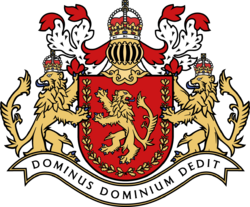Great Council of Great Nortend: Difference between revisions
Jump to navigation
Jump to search
(Created page with "The '''Great Council''' comprises Parliament, the Privy Council as well as the Judiciary of Geat Nortend#Hig...") |
No edit summary |
||
| (7 intermediate revisions by the same user not shown) | |||
| Line 1: | Line 1: | ||
The '''Great Council''' comprises | {{GNGB|Great Council|Erbonian Coat of Arms.png|||His Majesty's}} | ||
The '''Great Council''' comprises of both members of the [[Privy Council of Great Nortend|Privy Council]] and other members of the [[Parliament of Great Nortend|Parliament]]. , most of whom are not members of either the Parliament or Privy Council but nonetheless are members of the Great Council. | |||
The Great Council, as a session comprising the Parliament, the Privy Council together, is one of the three ways the ''Curia Regis'' may meet, along with sessions of just the Privy Council (or parts thereof) and sessions of just the Parliament (or parts thereof). | |||
All members of Great Council are entitled to the prefix 'Honourable'. | |||
{{GNC}} | {{GNC}} | ||
Latest revision as of 04:21, 1 August 2021
His Majesty's Great Council | |||||||
|---|---|---|---|---|---|---|---|
 | |||||||
| Part of a series on the Government of Great Nortend | |||||||
| The Crown | Alexander II | ||||||
| |||||||
The Great Council comprises of both members of the Privy Council and other members of the Parliament. , most of whom are not members of either the Parliament or Privy Council but nonetheless are members of the Great Council.
The Great Council, as a session comprising the Parliament, the Privy Council together, is one of the three ways the Curia Regis may meet, along with sessions of just the Privy Council (or parts thereof) and sessions of just the Parliament (or parts thereof).
All members of Great Council are entitled to the prefix 'Honourable'.
This page is written in Erbonian English, which has its own spelling conventions (colour, travelled, centre, realise, instal, sobre, shew, artefact), and some terms that are used in it may be different or absent from other varieties of English. |
